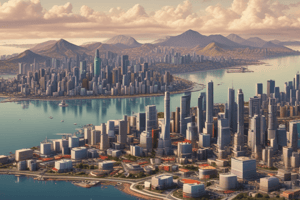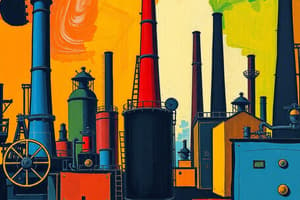Podcast
Questions and Answers
What is a primary consequence of rapid urbanization on cities?
What is a primary consequence of rapid urbanization on cities?
- Strain on infrastructure (correct)
- Enhanced agricultural productivity
- Technological innovation
- Decreased unemployment rates
Which factor is NOT commonly associated with driving urbanization?
Which factor is NOT commonly associated with driving urbanization?
- Improved infrastructure
- Push factors from rural areas
- Decline of industrial job opportunities (correct)
- Agricultural advancements
Which phase of industrialization is characterized by technologies such as textile machinery and steam power?
Which phase of industrialization is characterized by technologies such as textile machinery and steam power?
- Second Industrial Revolution
- First Industrial Revolution (correct)
- Digital Revolution
- Third Industrial Revolution
How does industrialization primarily affect social structures?
How does industrialization primarily affect social structures?
What urban growth model illustrates the spatial arrangement of various land uses?
What urban growth model illustrates the spatial arrangement of various land uses?
Which of the following is a characteristic of industrialization?
Which of the following is a characteristic of industrialization?
What type of challenges does rapid urbanization NOT typically cause?
What type of challenges does rapid urbanization NOT typically cause?
Which of the following best describes the relationship between urbanization and industrialization?
Which of the following best describes the relationship between urbanization and industrialization?
Flashcards
Industrialization
Industrialization
The process by which societies shift from agricultural economies to economies focused on factory production.
Urbanization
Urbanization
The process of an increasing percentage of a population living in urban areas.
Industrialization's role in Urbanization
Industrialization's role in Urbanization
A significant factor driving urbanization, attracting people to cities for job opportunities.
Key characteristics of Industrialization
Key characteristics of Industrialization
Signup and view all the flashcards
Impacts of Industrialization
Impacts of Industrialization
Signup and view all the flashcards
First Industrial Revolution
First Industrial Revolution
Signup and view all the flashcards
Second Industrial Revolution
Second Industrial Revolution
Signup and view all the flashcards
Third Industrial Revolution
Third Industrial Revolution
Signup and view all the flashcards
Study Notes
Urbanization
- Urbanization is the process where a growing proportion of a population resides in urban areas.
- It often accompanies industrialization, as factories and businesses draw people to cities for work.
- Factors driving urbanization include:
- Industrial job opportunities
- Agricultural advancements
- Improved infrastructure (roads, transportation, etc.)
- Pull factors from rural areas
- Push factors from rural areas (e.g., poverty, lack of opportunities)
- Urbanization increases population density, spurs economic growth, and brings about social changes in cities.
- Consequences of rapid urbanization include:
- Strain on infrastructure (housing, sanitation, transportation)
- Increased poverty and inequality
- Environmental problems (pollution, waste management)
- Social issues (crime, unemployment)
- Models of urban growth, including concentric zone, sector, and multiple nuclei models, illustrate the spatial distribution of urban land uses.
Industrialization
- Industrialization transforms societies from primarily agricultural economies to factory-based production.
- Key characteristics of industrialization include:
- Mechanization of production
- Mass production of goods
- Technological innovation
- Investment in factories and machinery
- Urban growth
- Industrialization substantially modifies social structures and economic systems.
- Impacts of industrialization:
- Increased productivity and economic growth
- Social changes such as urbanization, changes in family structure
- Environmental impacts such as pollution, resource depletion
- Different phases of industrialization exist, with varying levels of technological innovation, capital accumulation, and social/economic structure.
- First Industrial Revolution (textile machinery, steam power).
- Second Industrial Revolution (steel, electricity, internal combustion engine).
- Third Industrial Revolution (electronics, computers, information technology). Often called the Information Age.
Relationship between Urbanization and Industrialization
- Industrialization is a major driver of urbanization. Factories attract people seeking work, leading to city growth.
- Expanding industries cause cities to expand as rural residents seek employment.
- Urbanization and industrialization are interconnected processes, often occurring simultaneously.
- Industrialization makes cities centers of innovation, economic activity, and cultural exchange.
- Environmental consequences linked to both processes arise as pollution and resource depletion increase with factory and city population growth.
Studying That Suits You
Use AI to generate personalized quizzes and flashcards to suit your learning preferences.




